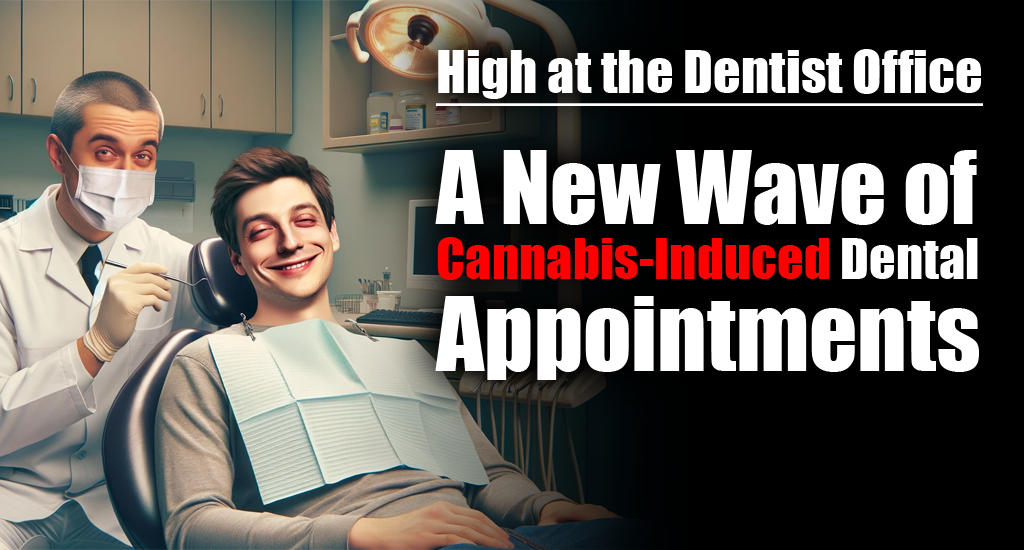
High at the Dentist Office: A New Wave of Cannabis-Induced Dental Appointments
In recent times, a notable trend has emerged in dental practices: patients arriving high, primarily due to marijuana use, for their dental appointments. This phenomenon raises several questions and concerns, both from the perspective of the patients and the dentists. The following article, divided into four sections, delves into this trend, exploring the reasons behind it, the implications for dental care, and the advice from dental professionals.
The increasing legalization of marijuana across various states has coincided with a rise in the number of patients attending dental appointments while under the influence. This behavior is often attributed to the patients' desire to alleviate anxiety related to dental procedures. However, this trend presents unique challenges in the realm of dental care, influencing both the approach of the dentists and the outcomes of the treatments.
Why Patients Choose to Get High Before Dental Visits
The increasing trend of patients getting high before dental visits, often due to marijuana use, is a multifaceted issue. This section explores the reasons behind this behavior, drawing insights from recent surveys and expert opinions.
-
Alleviating Dental Anxiety: A primary reason patients turn to marijuana before dental appointments is to reduce anxiety. Dental visits can evoke significant nervousness, and some patients believe that marijuana, known for its relaxing effects, can help them cope with this anxiety. This trend has been observed more frequently as marijuana becomes legal in more states.
-
Misconception About Marijuana's Effects: Many patients mistakenly believe that being under the influence of marijuana will make their dental experience less stressful. However, contrary to this belief, marijuana can lead to increased anxiety, paranoia, and hyperactivity, potentially making the dental visit more stressful.
-
Openness to talk to dentists about marijuana use: There is a growing awareness among dental patients about discussing marijuana use with their dentists, as 67% of patients in a survey expressed comfort in talking about their marijuana use with their dentist. This openness can help dentists better understand their patients' habits and provide appropriate advice.
-
Risks of Treatment Alteration: Being high on marijuana can affect how dental treatments are carried out. For instance, dentists might need to postpone treatments or alter anesthesia dosage, as marijuana can influence the central nervous system, affecting the efficacy of anesthesia.
-
Influence on Decision-Making: A clear head is crucial for making informed decisions about dental treatments. However, being under the influence can impair a patient's ability to understand and consent to treatment plans effectively.
-
Impact on Oral Health: Regular marijuana users are more likely to have oral health issues, including a higher risk of cavities, periodontal disease, and xerostomia (dry mouth). Additionally, marijuana use can influence dietary choices, often leading to unhealthy snacking, further affecting oral health.
-
Increased Risk During Procedures: Marijuana use can increase the risk of complications during dental procedures. It can cause increased bleeding, and the presence of THC can also interact with local anesthetics, leading to potential risks.
The Perspective of Dentists: Risks and Recommendations
Dental professionals face a unique set of challenges when treating patients who arrive at their appointments under the influence of marijuana. The American Dental Association (ADA) has shed light on these issues, providing a detailed insight into the risks and recommendations from the dentist's perspective:
-
Challenges with Anesthesia: One of the primary concerns for dentists is the altered state of consciousness of high patients, which can interfere with the effectiveness of anesthesia. The ADA's survey highlights that sometimes an increased dosage of anesthesia is required to treat patients who are high, complicating the treatment process.
-
Postponement of Treatment: Often, dentists find themselves in a situation where they have to postpone treatment. This is particularly the case when a patient's high state prevents effective communication or makes it unsafe to proceed with the planned dental procedure.
-
Exacerbation of Dental Issues: Regular marijuana use is associated with several oral health issues. Dentists are particularly concerned about conditions like dry mouth (xerostomia), which is a common side effect of marijuana use. Dry mouth can lead to an increased risk of gum disease and cavities.
-
Increased Risk of Bleeding and Complications: Another significant concern for dental health professionals is the increased risk of bleeding and complications during and after dental procedures in patients who use marijuana. This can make even routine dental work more complex and risky.
-
Impact on Decision-Making: The ability of patients to make informed decisions about their dental treatment is crucial. Dentists note that being high can impair a patient's judgment and ability to give informed consent, which is essential for any medical procedure.
-
Advice Against Marijuana Use Before Appointments: Dentists generally advise against the use of marijuana prior to dental appointments. The altered state due to marijuana use can lead to complications and make it difficult to achieve the desired outcomes of dental treatments.
-
Importance of Open Communication: Dental professionals emphasize the need for open communication about any drug use, including marijuana. This is vital for the safety and effectiveness of dental care. The ADA survey indicates that a significant percentage of patients are comfortable discussing their marijuana use with their dentists, which is a positive step towards safer dental practices.
-
Educational Role of Dentists: Finally, dentists play a key role in educating their patients about the potential adverse effects of marijuana use on oral health. This includes highlighting the risks associated with smoking marijuana, such as an increased risk of mouth and neck cancers, and encouraging good oral hygiene practices.
For more detailed information, you can refer to the ADA's article on this topic here. This article provides comprehensive insights into the challenges faced by dentists when treating patients under the influence of marijuana and the steps they recommend for safer dental care practices.
Conclusion
The trend of patients getting high before dental visits is a complex issue that intersects patient behavior, legal changes, and dental care practices. While the intent behind this behavior is to reduce anxiety, it often results in increased complications and challenges in dental treatment. Dental professionals play a crucial role in educating patients about the risks associated with this practice and in devising strategies to manage dental anxiety more effectively. As marijuana becomes more accessible, the dialogue between patients and dentists regarding its use in relation to dental care becomes increasingly vital.
In crafting this article, insights were drawn from a report by HealthDay News, which discusses this emerging trend and its implications in the field of dentistry【6†source】.



